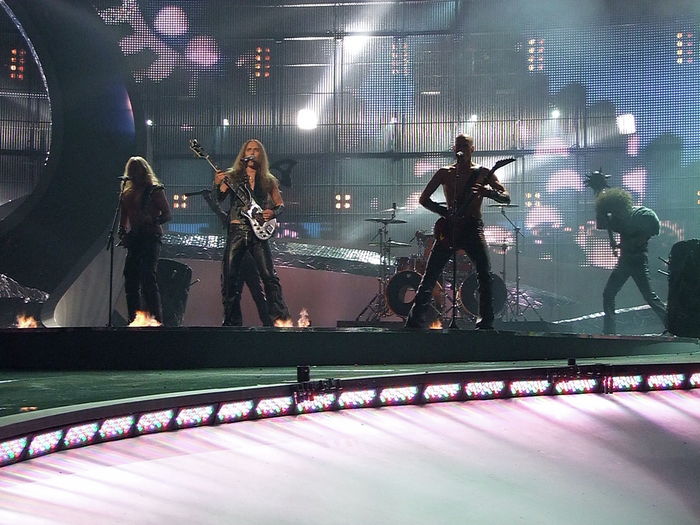Eurovision 2022: Analysing Ukraine’s performance “Stefania”
Yan-Yi Lee analyses Ukraine’s winning entry to Eurovision 2022 and argues that, despite the current political climate, it deserved to win

Following Ukraine’s victory in the Eurovision finals this past Saturday, voices in the media such as Piers Morgan have remained sceptical of the result, complaining that Ukraine’s Kalush Orchestra likely won due to “sympathy votes”. While it isn’t possible for this year’s Eurovision results to be apolitical, there are many reasons as to why Ukraine did, in fact, deliver a spectacular performance (watch the clip here) and deserved to win even despite the current political context.
As a foreigner who knows some Ukrainian, the most powerful aspect of the performance for me was the lyrics. Interestingly, “Stefania” was written before the war by Oleh Psiuk, the founder and rapper of Kalush Orchestra. The piece was originally dedicated to Psiuk’s mother, as the song documents his undying dedication to her as an adult. The chorus goes (followed by my interpretation in English):
“Стефанія мамо, мамо Стефанія
Розквітає поле, а вона сивіє
Заспівай мені, мамо, колискову
Хочу ще почути твоє рідне слово”
“Stefania Mother, Mother Stefania
The field is blooming, yet her hair is turning grey
Sing me a lullaby, Mother
For I want to hear your dear words again”
“Ukrainians came to explore how the song echoes strongly with their wider loyalty to ‘Mother Ukraine’”
These lyrics appear to have taken on new meaning following Russia’s invasion of Ukraine in February, and Ukrainians came to explore how the song echoes strongly with their wider loyalty to “Mother Ukraine”. There is not a single mention of destruction or bloodshed in the entire song but, as is written in the song’s official Youtube video, “the war in Ukraine has multiple faces, but it is our mother’s face that keeps our hearts alive in the darkest times.” Among the lyrics, I found “рідне” (“ridne”) to be the strongest word, as it embodies a cocktail of emotions that are hard to translate to English. The word itself alludes to feelings of endearment, nativeness, homeliness, and nostalgia, and how, no matter how tough a man grows up to be, the memory of his mother would always bring that last shimmer of hope. Such feelings towards the motherly figure reflect much of what I know about Ukrainian values, and these feelings remain deeply relevant today, especially considering the current political crisis.
Aspects of Ukraine’s old and new musical cultures also come together harmoniously in “Stefania” as both traditions are used and respected in the song. The piece opens with vocalist Tymofii Muzychuk’s solemn interpretation of the chorus – four lines with the exact same tune which carry somewhat of a folkish flavour. This is followed by Psiuk’s fast, groovy rap and then the pre-chorus, which takes on the aura of a lullaby. The traditional Ukrainian flute (сопілка “sopilka”) that is played in between the chorus and the second verse adds the extra cherry on top, bringing in a sassy, highly rhythmic and catchy tune that people can’t help but dance to.
“The non-musical elements of the performance complement the essence of ‘Stefania’ perfectly”
The non-musical elements of the performance complement the essence of “Stefania” perfectly. Outfit-wise, the Keptar Hutsul vest and full suit worn by Psiuk and Muzychuk respectively are iconic near the Carpathian Mountains, where the city of Kalush sits. The strong contrasting colours of Psiuk’s pink hat, along with dancer Vlad Kurochca’s vibrant-patterned clothing which he wears face to toe, bring in a modern touch which beautifully contrasts the traditional clothing worn elsewhere. Kurochka’s impressive dancing also draw on a storm of hype with the flute in the background, leading the audience to cheer on. The stage design’s ethnic patterns, coupled with close-up clips of blinking eyes and hands in the background seem to embody the tender gaze and warm touch of a Ukrainian mother.
Even for those who see the performance as perhaps too pompous for their taste, it is hard to deny that Ukraine’s energy in the contest was simply applaudable in such trying times. Despite current hardships, Ukraine delivered a colourful performance with incredible energy, emanating sprightly vibes while alluding to a brave motherland that continues standing. If the performance itself isn’t enough, the official video of “Stefania”, which depicts stories of mothers leaving their children behind to defend Ukraine, speaks volumes.
All in all, for me Kalush Orchestra’s “Stefania” spoke most strongly to the purpose of Eurovision with its celebration of both national individuality and continental unity. In the span of only three minutes, the group proudly celebrated their traditions and values with a modern, innovative touch, while at the same time demonstrating a tenacity so strong that it reminded us of what it ultimately means to be European. Eurovision 2022 may have ended, but the Kalush Orchestra’s legacy will never fail to live on.
 News / Uni partners with controversial Hong Kong university2 April 2025
News / Uni partners with controversial Hong Kong university2 April 2025 News / Hundreds of jobs to be cut at Cambridge University Hospitals1 April 2025
News / Hundreds of jobs to be cut at Cambridge University Hospitals1 April 2025 Comment / More Cambridge students should study abroad 1 April 2025
Comment / More Cambridge students should study abroad 1 April 2025 News / Caius clock hand returned nearly 100 years after student prank31 March 2025
News / Caius clock hand returned nearly 100 years after student prank31 March 2025 Lifestyle / A Goodchild’s Cambridge Confessional: Volume 23 April 2025
Lifestyle / A Goodchild’s Cambridge Confessional: Volume 23 April 2025



